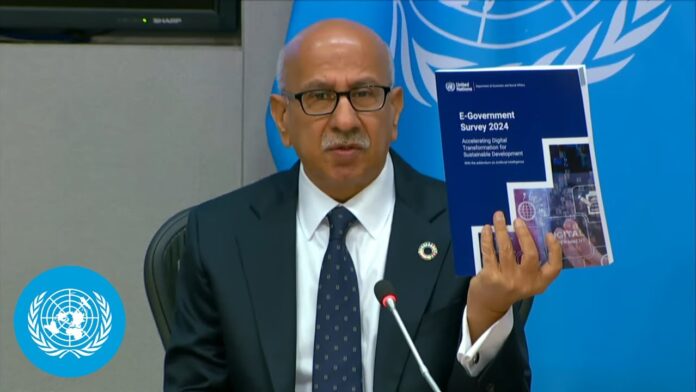The Kingdom’s leap of 25 places highlights its significant strides in digital transformation, thanks to Vision 2030 and robust government support.
Saudi Arabia has made remarkable progress in the UN’s E-Government Development Index (EGDI) for 2024, ascending 25 positions to become a leading global player in digital government services. Released on Tuesday, the index places Saudi Arabia as the top country in the region, the second highest among G20 nations, and fourth globally.
The Saudi Minister of Communications and Information Technology, Abdullah Al-Swaha, attributed this impressive leap to the steadfast support and empowerment of King Salman and Crown Prince Mohammed bin Salman. Al-Swaha highlighted that this advancement aligns with the objectives of Saudi Vision 2030, which aims to diversify and modernize the Kingdom’s economy and infrastructure.
The UN report also commended Saudi Arabia’s advancements in broader digital government arenas. The Kingdom now ranks sixth worldwide in the overall field of digital government, demonstrating its substantial improvements in infrastructure, e-participation, and online services. Riyadh itself achieved third place among 193 cities evaluated globally, reflecting the city’s enhanced digital engagement and services.
The Governor of the Digital Government Authority, Ahmed Alsuwaiyan, emphasized that the Kingdom’s progress on the index underscores its commitment to providing top-notch digital government services. The achievements are credited to Vision 2030, which has significantly influenced the enhancement of Saudi Arabia’s digital framework and overall governance.
Since the inception of Vision 2030 in 2016, Saudi Arabia has seen significant improvements in various indexes. The country climbed 53 places on the Telecommunications Infrastructure Index, advanced 31 positions on the Human Capital Index, and surged 67 places on the Online Service Index, now holding fourth place globally. This progress is a testament to the Kingdom’s ongoing efforts to boost its digital capabilities and service delivery.
The UN’s E-Government Development Index, published every two years, is a crucial international benchmark for evaluating the effectiveness of digital government frameworks. It measures structural reforms’ impact on productivity, efficiency, and user experience. Saudi Arabia’s substantial rise in the rankings reflects its successful implementation of digital government regulations and its commitment to open data accessibility and e-participation.
Analysis:
Political: Saudi Arabia’s advancement in the EGDI underscores the effectiveness of its Vision 2030 strategy in driving national development. The government’s focus on digital transformation reflects a broader political commitment to modernization and efficiency. By securing a top spot globally, Saudi Arabia reinforces its position as a progressive leader in the digital realm, aligning with its geopolitical ambitions and showcasing its capability to lead in technology-driven governance.
Social: The significant leap in the EGDI highlights Saudi Arabia’s efforts to enhance public services and citizen engagement through digital means. Improved digital infrastructure and services contribute to better access to information and government services for the public, promoting greater transparency and inclusivity. The progress reflects a societal shift towards more efficient and responsive governance, which can enhance overall public satisfaction and engagement.
Racial: While the EGDI primarily focuses on technological and infrastructural metrics, the improvements in digital services may have indirect effects on racial inclusivity. By advancing digital infrastructure, Saudi Arabia potentially broadens access to services for all demographic groups, including marginalized communities. Enhanced digital engagement platforms can contribute to more equitable participation and representation in government services.
Gender: The advancements in digital government services also have implications for gender inclusivity. Enhanced online services and e-participation tools can provide greater opportunities for women to engage with government processes and access services. Saudi Arabia’s progress in digital governance aligns with ongoing efforts to improve gender equality and empowerment as part of its broader Vision 2030 goals.
Economic: Saudi Arabia’s improved ranking on the EGDI is a reflection of its successful digital transformation initiatives, which are crucial for economic diversification. By investing in digital infrastructure and services, the Kingdom enhances its business environment, attracts investment, and boosts productivity. The progress in digital government services supports economic development by streamlining processes, reducing bureaucracy, and fostering innovation.
